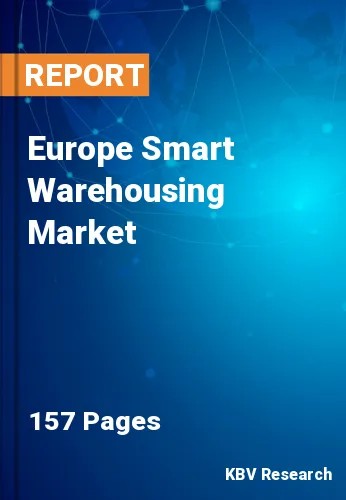The Europe Smart Warehousing Market would witness market growth of 10.5% CAGR during the forecast period (2022-2028).
A smart warehouse is a large facility that stores raw materials and finished goods & employs machines and computers to complete routine warehouse operations previously performed manually. These procedures include detecting and receiving orders, storing products, counting products and locating them, and sending orders to the appropriate location. The best smart warehouses automate practically the whole process of moving products from supplier to client, with lesser errors.
Artificial intelligence (AI), the internet of things (IoT), and automated guided trucks are a few of the automated & interconnected technologies that are leveraged in the development of a smart warehouse system. These technologies are integrated in order to boost warehouse productivity and efficiency. The use of smart warehousing techniques assists to lower the count of human workers on the job and reduces operational faults. In today's mobile-driven world, end-user adoption of smart warehouse facilities has increased to match customer demands for on-time product delivery.
Europe region are increasingly adopting the technology of smart warehousing to match with dynamic nature of warehousing industry. DHL, the German logistics giant, has announced that it is collaborating with Cisco & start-up Conduce to develop smart warehouses in Germany, the Netherlands, and Poland. Cisco's Wi-Fi infrastructure technology & Conduce's operational data visualization platform is at the major focus of this project, which is presently being tested in three locations and intends to show IoT data to managers in easy-to-understand ways, allowing them to figure out what's going on in their business. The benefits of supply chain operations are obvious. This blend of technology allows the logistics behemoth to monitor supply chain activity in real-time by viewing data received from scanners & material handling equipment in its hubs, as well as data from its warehouse management system.
The Germany market dominated the Europe Smart Warehousing Market by Country in 2021, and would continue to be a dominant market till 2028; thereby, achieving a market value of $1,848.8 million by 2028. The UK market is anticipated to grow at a CAGR of 9.5% during (2022 - 2028). Additionally, The France market would display a CAGR of 11.3% during (2022 - 2028).
Based on Deployment Mode, the market is segmented into On-premises and Cloud. Based on Technology, the market is segmented into Automated Guided Vehicles (AGV), IoT & Analytics, RFID, AI in Warehouse, Blockchain & Others. Based on Application, the market is segmented into Transport Management, Inventory & Order Management, Yard & Shipping Management, Labour Management, and Others. Based on Component, the market is segmented into Hardware, Solution (Warehouse Management Systems and Warehouse Control Systems & Others), and Services. Based on Organization Size, the market is segmented into Large Enterprises and Small & Medium Enterprises (SMEs). Based on Vertical, the market is segmented into Transportation & Logistics, Retail & Consumer Goods, Automotive, Government, Healthcare & Life Sciences, Manufacturing, Mining, Food & Beverages, and Others. Based on countries, the market is segmented into Germany, UK, France, Russia, Spain, Italy, and Rest of Europe.
Free Valuable Insights: The Global Smart Warehousing Market Size will Hit $29 Billion by 2028, at a CAGR of 11.2%
The market research report covers the analysis of key stake holders of the market. Key companies profiled in the report include IBM Corporation, Oracle Corporation, SAP SE, Infor, Inc., Softeon, Körber AG, Manhattan Associates, Inc., PTC, Inc., Tecsys, Inc., and Epicor Software Corporation.
By Deployment Mode
By Technology
By Application
By Component
By Organization Size
By Vertical
By Country
Our team of dedicated experts can provide you with attractive expansion opportunities for your business.

